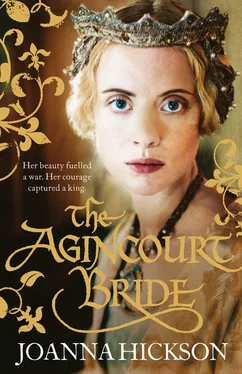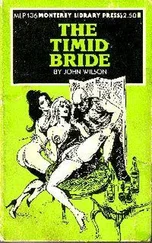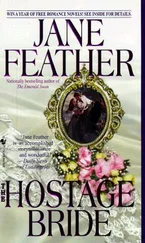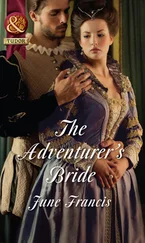‘Is she not the Duke of Burgundy’s daughter?’ I asked, keen to prompt more information. Fox-face had a wine skin clamped between his thighs, from which, by the looseness of his tongue, he had been drinking freely.
‘Yes, that is the trouble. The dauphin hates her father’s guts so he wants nothing to do with her. Perhaps she prefers being locked up in a nunnery to being married to him, but it is my bet she prays for the day the Duke of Burgundy comes back to Paris!’
I chose my next words carefully. ‘I hear that he still has many followers in the city.’
A grin split the chamberlain’s narrow face and he nodded vigorously. ‘So he does and they say that he is wooing the English as well, offering his own daughter, Catherine, as bait. Hey, look – the fun is about to start!’
Another loud blast of trumpets announced the first joust, a contest between the dauphin and the Earl of Dorset, the English king’s uncle who was leading the embassy. The two contenders cantered up to the royal pavilion to make their salute. It was the first time I had clapped eyes on Prince Louis since he had quit the palace garden as a nine year old boy and frankly I was shocked.
Now eighteen, he could only be described as fat. No – he was obese! I had been expecting an older, taller version of the lanky boy who had dropped the caterpillar down my bodice. It hadn’t occurred to me that the deprivations of his youth might have turned him into a glutton. Only a half-blind sycophant could have called him handsome, for his features were blurred by puffy jowls and multiple chins, his eyes appeared mean and small, sunk into the flesh of his cheeks and his hair was shaved high up the back of his head in the mode currently favoured by young men-about-court, exposing thick rolls of fat on the back of his neck. Only his aquiline Valois nose remained distinctive, unmistakably declaring his lineage. In his huge suit of armour his body was a vast metal hulk covered with a blue and gold surcôte and squashed into a high-cantled jousting saddle. Somehow a horse had been found strong enough to bear his weight, but getting him onto its back must have required substantial lifting-gear. Even from afar he did not look well. If he had still been in my charge I would have prescribed a strong purge and a prolonged diet of bread and water.
Although in boyhood Louis had been the brighter of the two princes, it was Jean who had excelled with the sword and, now that he was a man, Louis still showed little skill at knightly pursuits. To the disappointment of the crowd, he was trounced by the considerably older Earl of Dorset whose lance scored a direct hit on the first pass, such as would have lifted a normal man out of the saddle but which barely nudged the elephantine heir of France. My garrulous neighbour informed me that the rules of chivalry stipulated that the loser in a joust must forfeit the price of his armour, which in the dauphin’s case must have been a considerable sum, so it was hardly surprising that Prince Louis was puce with anger when he joined his family in the royal pavilion to watch the rest of the tournament.
Over the next few hours the cream of French and English chivalry rode against each other in a blur of colours, dust and glinting steel. It was a brutal spectacle and more than once I regretted bringing Alys along. Numerous armoured men had to be dragged from the ground on hurdles, their helmets so badly dented that their skulls must have burst within them, and right in front of us a magnificent horse suffered a crashing fall, snapping its foreleg. The poor beast screamed and thrashed for many agonising minutes before it could be bludgeoned out of its misery and hauled away across the sand. During this incident Alys hid her face against my shoulder and I looked anxiously across at Catherine expecting to see a similar reaction on her part, but her expression remained rigidly schooled, as if such stomach-churning sights had been a daily occurrence at Poissy Abbey!
The grand finale of the day was to be a mêlée, when the jousting rails were removed and the French and English knights staged a mock battle in the open arena, challenging each other at random until the heralds judged which side had won. I wanted to take Alys away from what I feared might be another bloody spectacle but, just as we were about to leave, the Earl of Dorset rode up to the royal stand. ‘If the beautiful daughter of France will grant me a favour for the coming trial I will carry it on behalf of my nephew King Henry,’ he declared gallantly.
The crowd roared its approval of a gesture made in the true spirit of chivalry. I could see Catherine glance at the queen who nodded indulgently but, as she leaned over to pluck a lily from the floral display, the dauphin moved to restrain her.
‘No favours for the English!’ he bellowed, rising to his feet. ‘Not while they plot to snatch France from its rightful heirs!’ He had a voice to match his bulk and his words echoed clearly around the lists. ‘Go back to your nephew, Dorset, and tell him that his dream of possessing my sister founders on his daydream of stealing my father’s lands. You may have won in the lists, my lord, but I vow before God and St Denis that that is the last victory England shall have over France!’
Dorset’s reply was lost in the general hubbub that followed, and some of the French and English knights, who had been swapping rude gestures and insults ahead of the mêlée, decided to forego ceremony and clash swords before the trumpet sounded; instantly a war developed which the heralds had no chance of controlling.
In the palace viewing arena many of the male servants began to join in the fun, standing on their seats and shouting encouragement with wine-fuelled gusto, among them the foxy-faced chamberlain. ‘There goes your lady’s marriage!’ he yelled at me as I pulled Alys away. ‘If English Henry wants her, he will have to come and get her!’
‘This is the last straw!’ exclaimed Bonne, furiously pressing all her weight against the door of Catherine’s bedchamber. ‘Either you admit me to the princess’ presence instantly or I will go straight to the queen and demand that you be removed from her highness’ service immediately.’
I am a sturdy body and had no difficulty keeping hold of the door, but I cannot pretend that her words did not send cold shivers down my spine. I reckoned that, influential though her family was, Bonne did not have the clout to actually demand such a thing of the queen, but a sly remark, dropped at the right moment, would have the same effect. By thus barring her entrance, it was possible I could find myself in the Châtelet by evening, or at the very least expelled from the palace. Nevertheless, I held firm.
‘Believe me, Mademoiselle, it is for your own safety that I respectfully suggest that you do not enter,’ I insisted in a far from respectful tone of voice. Bonne had managed to wedge her foot in the door and our conversation was conducted through the narrow gap. ‘The princess has a fever and until we know the exact nature of the illness she gave orders that no one else is to come near her. The physician has been sent for, but meanwhile she asks that you and her ladies pray that it is not serious or infectious.’
For a moment the sliver of Bonne’s face that was visible to me expressed doubt, swiftly replaced by firm resolve. ‘This state of affairs has been allowed to go too far,’ she said with cold finality. ‘It should not be some ignorant, jumped-up tire-woman who decides whether or not the princess has a fever and who takes it upon herself to send for the physician, it should be the queen’s appointed lady-in-waiting. I shall remain here until the physician comes, and then I shall accompany him to her highness’ bedside and inform the queen of his conclusions. I shall also inform her of the dangerous position of influence a common creature from the back streets has been allowed to assume over her daughter.’
Читать дальше












